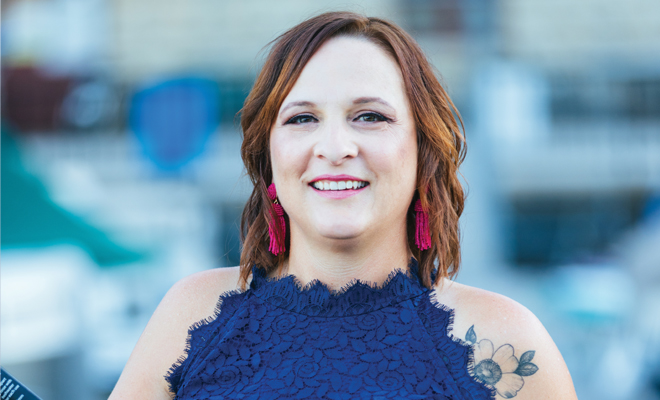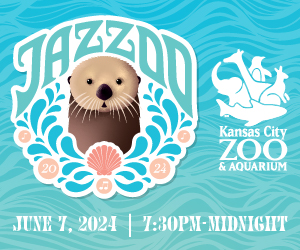 Amber Deery
Amber Deery
Michelle Steger: “We are all athletes paddling to the same heartbeat!”
“Row, row, row, your boat” takes on a new meaning for breast-cancer survivor Michelle Steger. However, when she gets behind the paddle, there’s nothing “gently down the stream” for this Lansing, Kansas, wife and mother of three. She is championing a group of paddlers who are plying the waters of their cancer journey and calling upon the strength of the mythical dragon. The KC Pink Warriors is a community of women cancer survivors who inspire, restore and empower through dragon boat competition and team connection.
It’s extremely therapeutic to leave your phone and all the stresses of your life on land and get on that boat. It’s you, your paddle, the water and your 21 sisters. I liken it to a floating support group, a unique support group,” shared Michelle. “You must train hard to do well and to keep that sense of recovery from your cancer. It’s a way to help open up the chest wall. After radiation and surgeries, we lose strength and flexibility in our arms and chest. Dragon boat racing helps us regain that ability.”
Michelle, a former Florida resident, has participated in several dragon boat racing teams including the Pink Dragon Ladies of Tampa and Warriors on Water in Orlando. As the founder and president of the KC Pink Warriors, she brings a passion and love of the sport that few can match. “My nickname amongst the team is ‘Mother of Dragons,’” she commented. “It’s a big compliment, and I kind of love it when they call me ‘mama’ or ‘mama dragon’ for short.
History of Dragon Boat Racing
Dragon boat racing originated about 2,000 years ago in southern China and is linked to ancient folk rituals of villagers including religious events, community gatherings and competitions. Now, it is enjoyed by teams all over the globe. In the beginning, crafts were fashioned from wood but now they feature modern, lightweight materials such as carbon fiber and fiberglass. The boats, sporting the head of a dragon, are about 40 feet long and 4 feet at the widest point and normally hold 20 paddlers, sitting two-by-two. A steersperson, equipped with a nine-foot oar, guides the vessel, and a drummer keeps the rowers in sync. In 1976, dragon boat racing was recognized as an international sport with competitions held across the world. Contests can range from 200 to 2,000 meters, but 500 meters is the standard race. The KC Pink Warriors possess two dragon boats and have been together for nearly four years.
“We liken the stroke that we use as the drum hits the water to a heartbeat, and we all share that heartbeat together. A sisterhood,” said Michelle. “We’re really all in the same boat.”
Disney World Detection
Michelle discovered her cancer while waiting to meet Donald Duck at Disney World. She called Tampa, Florida, home for several years and the family enjoyed annual passes to the theme parks. During this visit, she remembers feeling a lot of pain in her left breast and her bra was not setting right on her chest. The next day she spotted a sizable lump very close to her skin. A mammogram revealed cancer in her left breast.
She immediately underwent a bilateral mastectomy, followed by an aggressive treatment plan of chemo and then 30 rounds of radiation, every day for six weeks. She has been in remission since June 2017.
After her diagnosis, Michelle recalls that she and her husband believed there had to be a reason and that this could lead to something bigger for them and perhaps an opportunity to help others. After her treatment, she felt very healthy — almost like a new person — but as a stay-at-home mom, she needed something new in her life. In October 2017, she met Jonny Wright, a member of the Pink Dragon Ladies, a dragon boat for cancer survivors in Tampa. She urged Michelle to join the team, and at the first training, Michelle was hooked.
“I missed being an athlete and this was going to make me an athlete again. I checked it out and didn’t know a soul in practice yet I was met with hugs and open arms. Going through cancer treatments can be so lonely, but this experience was life-changing,” Michelle stated. “I was hooked before I got into the boat because they were so welcoming. Then I got into the boat and it was a very therapeutic process for me. I fell in love. It didn’t take long to be bitten by the dragon.”
When A Concept Is All Wet
The idea of cancer survivors engaging the chest wall with various exercises was once frowned upon by the medical community. The fear was this type of movement, whether it’s chopping vegetables, raking leaves or paddling a boat, could be harmful. It might bring on lymphedema, a buildup of lymph fluid in the fatty tissues just under the skin, which can result in swelling and discomfort. However, Canadian researcher Dr. Don McKenzie decided this was nonsense and called upon colleague and breast cancer survivor Dr. Susan Harris to recruit women to participate in his research. It would involve women paddling a dragon boat as the basis of their project. Their research showed that not only is exercise safe for breast cancer survivors, but it can also reduce rates of recurrence. With that, cancer survivors, especially those with breast cancer, embraced the sport of dragon racing.
“Many people, when they refer to the dragon, say that you have to conquer or slay it. It’s something bad to be destroyed,” noted Michelle. “In Chinese culture, it’s a symbol of strength and good luck. It’s a positive figure. So, it’s appropriate for cancer survivors to have this dragon symbol to protect us through our journeys.”
Paddles Up!
The KC Pink Warriors are dedicated to their sport by training three times a week for about an hour and a half each time. Team ages run from 35 to 69 years old, and it’s a sport that people can enjoy well into their elderly years. Michelle notes that competitions include various teams; some with disabilities such as blind paddlers, paraplegics and others. KC Pink Warriors practice on the water at the Wyandotte County Lake during the spring, summer and early fall months and off the water during the winter. They have traveled hundreds of miles to compete in races held in Chicago, Oklahoma and Iowa, and the paddlers head to Orlando this month. The team can choose to compete in breast cancer survivors, all-cancer survivors and the women’s open competition, but most of the time, they compete in the breast cancer survivors’ category. Michelle has even participated in the International Breast Cancer Paddlers’ Commission Dragon Boat Festival held in 2018 in Florence, Italy. She reports that over 3,000 breast cancer survivors participated in the contest that’s held every four years.
When she moved to Kansas in 2018, Michelle brought her love of dragon boat racing and set up the KC Pink Warriors, the first full-time dragon boat team in Missouri and Kansas. She created a nonprofit to grow the organization and fundraise to purchase a dragon boat. Michelle offers this key learning about setting up a nonprofit.
“In general, my advice would be that the governmental red tape can be scary but I found they will let you know if you’ve made a mistake and allow you to make corrections,” she remarked. “So many people are afraid of the government. I was too, and it took me months to get the courage to fill out the paperwork, and I made mistakes. So do your research, have patience with the process and have faith in yourself to make it happen.”
Michelle recalls that the group’s fundraising efforts were a bit “sticky” at first because they pushed a lot of wax. In about six months, the paddlers sold Candle Queen Candles out of Leavenworth, raising much of the $13,000 needed to pay for their first boat, the KC Rise.
Keep Calm and Paddle On
Whether you would like to be paddling a boat or cheering from the banks, Michelle and the KC Pink Warriors remind you that cancer can be a dreadful word, but the support of others can make an incredible difference.
“There is so much fear and uncertainty when you receive a cancer diagnosis and that fear and uncertainty continue throughout the treatment. It’s hard to see the light at the end of the tunnel when you’re struggling through those big treatments and decisions,” she noted. “Our team shows there’s a bad-ass life to be lived during and after cancer. We were, and some still are, cancer patients, but now we are all athletes paddling to the same heartbeat. We provide an outlet for survivors and thrivers to keep fighting and carry on. We’re living our best lives.”









